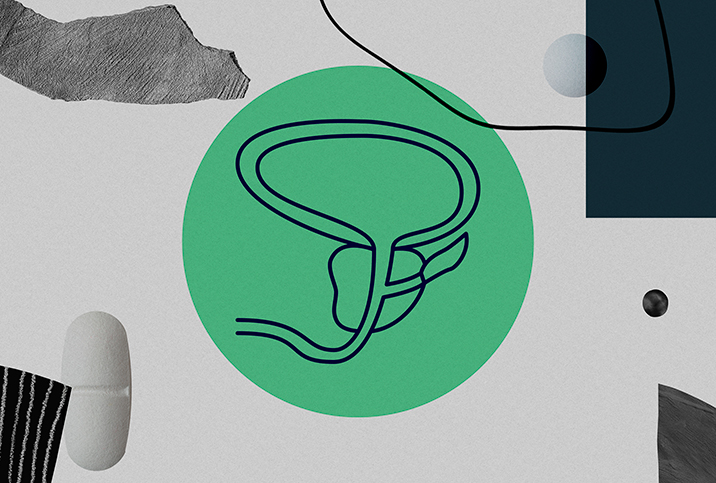What You Need to Know About H2 Blockers

Anyone who has suffered the effects of excess stomach acid knows how nice it can feel to find relief. Often, that relief comes from H2 blockers, a class of drugs meant to inhibit the production of stomach acid produced by the gastrointestinal (GI) tract.
They are also known as H2 receptor blockers, or H2 receptor antagonists (H2RAs).
How much do you know about these medicines? If the answer is "not much," read on to find out who needs them, how effective they are, how they're used in clinical practice, and their potential impact on overall and sexual health. Find out some of the different types of H2 blockers and how to use them responsibly.
Why do people need H2 blockers?
Just because they are widely available over-the-counter (OTC) medications, H2 blockers shouldn't be dismissed.
"H2 blockers, also known as H2 receptor antagonists, are a group of medicines most commonly used to reduce the amount of acid produced by the cells in the lining of the stomach through blocking the action of histamine on the histamine-2 (H2) receptors in the stomach. They work by reducing the production of stomach acid and are mainly used to relieve the symptoms of conditions," said Abbas Kanani, M.R.Pharm.S., the superintendent pharmacist at the online pharmacy Chemist Click, based in the United Kingdom.
H2 blockers can help with a number of conditions. Semiya Aziz, M.B.B.S., B.Sc., a general practitioner in the U.K., explained a few of the most common ones:
- Gastroesophageal reflux disease (GERD). H2 blockers work by reducing the amount of acid produced in the stomach, which can help relieve symptoms of GERD such as heartburn, regurgitation and difficulty swallowing.
- Heartburn. H2 blockers are often used to treat heartburn, which is a burning sensation in the chest or throat caused by stomach acid that refluxes into the esophagus.
- Peptic ulcer disease. This common condition causes sores or ulcers in the lining of the stomach or duodenum (the first part of the small intestine). H2 blockers can help reduce the amount of acid in the stomach, which can help promote healing of the ulcers.
H2 blockers may also be used in the treatment of other GI disorders, such as Zollinger-Ellison syndrome (digestive disorder), dyspepsia (indigestion) and gastritis (inflammation of the stomach), Aziz added.
Discovery and history of H2 blockers
Today, a person suffering from a peptic ulcer or an uncomplicated gastric condition can simply visit the nearest pharmacy, get a prescription and purchase an H2 blocker. Their condition will eventually subside—effects and duration will vary from one person to another—as the stomach acid is suppressed and healing is facilitated.
However, this was not the case prior to the 1970s. In fact, according to the American Chemical Society, peptic ulcers were once a life-threatening condition with terrible long-term outcomes and no effective treatment options before the development of H2 blockers.
A multidisciplinary research team at Smith Kline & French's in the U.K. decided to study the acid secretion mechanism of the body. Sir James Black was the team leader. He was later awarded the Nobel Prize in medicine for his groundbreaking contributions to pharmacology. According to the Royal Society of London, Black's ideas had a significant influence on the entire field.
Modern drug discovery owes a lot to the creativity of scholars such as Black and his team, who were among the first to tackle the process using a first-principles approach. Not only is he credited with the invention of H2 blockers but also the invention of beta blockers.
Significantly, these two pharmacological breakthroughs were the first nonaddictive drugs to hit $1 billion in sales (each). H2 blockers were the highest-selling class of pharmaceuticals right up to the beginning of the 21st century, according to research.
Black's success is largely owed to his first-principles approach to drug discovery. The approach relies on finding the fundamental mechanisms involved in the specific condition or disease being studied and then designing synthetic targeted medications to modulate these processes.
In the case of H2RAs, Black's team recognized that stomach acid secretion was primarily controlled by histamine, a naturally occurring compound in the body. Histamine binds to histamine-2 (H2) receptors on the surface of the parietal cells in the stomach lining, stimulating the production and release of gastric acid.
With this knowledge, Black and his team set out to develop a molecule that could selectively block the H2 receptors. This blockage would reduce acid production and provide relief for individuals suffering from acid-related GI disorders.
Their efforts led to the discovery of cimetidine, the first H2 blocker, which was introduced in the 1970s under the brand name Tagamet and revolutionized the treatment of peptic ulcers, GERD and other acid-related conditions.
More H2 blockers have been developed
Since the introduction of cimetidine, other H2 blockers have been developed. Each has its own unique properties and advantages:
- Famotidine (Pepcid) is available either OTC or by prescription, depending on the dose. Famotidine is the most potent H2RA (40 times more than cimetidine), offers a longer duration of action and reduces the likelihood of adverse side effects caused by potential drug interactions when compared with cimetidine, which is generally considered safe.
- Nizatidine (Axid) is similar to famotidine in terms of potency and duration of action, though it is not as widely used. It is available by prescription only.
- Ranitidine (Zantac) was previously available but has been withdrawn in the United States, the U.K. and other countries due to carcinogen contamination during manufacturing. Some studies have suggested no significant link between increased cancer risk and ranitidine use, with the caveat that more research is needed.
While histamine is multifaceted and complex, modern medicines—the discovery of H2 blockers, specifically—can target very specific receptors in the stomach with minimal disruptions to other bodily processes.
Apart from regulating stomach acid secretion, histamine also has a crucial role in the immune system, acting as a mediator in inflammatory responses and allergic reactions. Additionally, it functions as a neurotransmitter in the central nervous system, regulating sleep/wake cycles and other cognitive processes.
Generations of H2 blockers
H2 blockers have advanced and evolved since their introduction.
First-generation H2 blockers include cimetidine, ranitidine and famotidine, according to Kanani. They are effective at reducing gastric acid secretion but have several limitations, such as drug interactions and adverse effects.
On the other hand, second-generation H2 blockers, such as nizatidine, are considered safer and more effective than first-generation H2 blockers. They have fewer drug interactions and are associated with fewer adverse effects.
Third-generation H2 blockers, such as lafutidine, are mainly used in Japan and are reported to have a longer duration of action and higher efficacy compared with the earlier generations, Kanani said.
Risks, side effects and adverse effects
"H2 blockers are considered generally safe. There are some common side effects that, like any medication, can occur in patients," Kanani said.
Side effects can include the following:
- Headaches
- Dizziness
- Nausea
- Extreme fatigue
- Diarrhea
- Constipation
- Abdominal pain
"The main risk for me is the fact that [taking H2 blockers] often masks symptoms, which can be dangerous. If your doctor has checked you and your symptoms do not appear to be as a result of a serious underlying condition, such as cancer, you can use H2 blockers to help manage symptoms," Kanani noted.
"However, if you have a serious underlying condition that is causing symptoms of acid reflux, you may well find that H2 blockers help to manage symptoms," Kanani added. "[But] they are effectively masking the symptoms, which can lead to a delay in diagnosis and appropriate management."
See your doctor if your symptoms occur several times a week and H2 blockers don't appear to be helping. Definitely seek help if the following circumstances are true:
- Your symptoms are severe enough that they affect your daily life and sleep
- You have difficulty swallowing
- You are age 55 or older and experiencing symptoms for the first time
- You are experiencing other symptoms, such as weight loss, vomiting or blood in your stool
What are the sexual and mental health effects of H2 blockers?
Gastrointestinal disorders can play a role in an individual's negative mental state, be it anxiety or depression, according to Aziz. Therefore, it's possible the treatment of GI disorders with H2 blockers to relieve symptoms can help reduce negative mental states and, potentially, lift overall well-being.
It should be noted, however, that some patients report a range of central nervous system reactions that may manifest as a result of taking H2 blockers, including the following:
- Confusion
- Agitation
- Delirium
- Hallucinations
- Irritability
- Depression
Aziz said these symptoms usually clear up once the patient stops taking the drug.
"H2 blockers, like all medications, can have side effects," she said. "Interestingly, sexual side effects seem to occur much more frequently in men than women, often due to disruption of the endocrine/hormonal system. However, this is often duration- and dose-dependent."
The sexual side effects of H2 blockers may include the following:
- Low testosterone levels
- Decreased libido
- Erectile dysfunction (ED)
- Reduced sperm count
- Male breast enlargement
Whether those side effects are acceptable is up to each individual, but they are definitely worth a conversation with your doctor. Together, you can weigh benefits versus side effects.


















